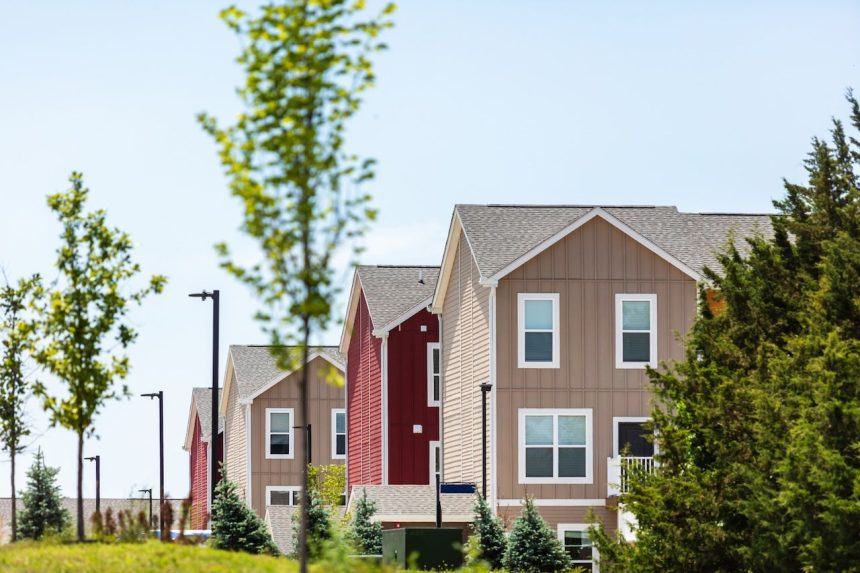eyecrave productions/Getty Images
Planning to buy or sell a home in Kansas? No matter which side of the transaction you’re on, be prepared to pay for your share of closing costs, the set of fees and expenses that are due at a real estate closing.
Although Kansas has lower average closing costs than many other states, they can add up quickly, amounting to thousands of dollars for each party. Here’s how those costs can affect the price of buying or selling a home in Kansas.
How much are closing costs in Kansas?
Closing costs vary by state, lender, home price and other factors. In Kansas, average closing costs total 1 percent of a home’s sale price (not including real estate agent commissions), according to the most recent data from CoreLogic’s ClosingCorp. That’s lower than most states, including neighboring Nebraska (1.2 percent) and Oklahoma (1.5 percent).
So, how much would Kansas closing costs equate to on a typical home sale? As of November 2024, the median sale price of a house in the Sunflower State was $280,800, per Redfin data. On a transaction like that, closing costs of 1 percent would add up to $2,808.
However, you could pay more or less depending on the prevailing prices in your location within the state. In Topeka, for example, the median sale price was just $172,425, which puts average closing costs at $1,724. But in Overland Park, where the median was significantly higher at $450,000, 1 percent would equal $4,500.
Who pays closing costs in Kansas, buyers or sellers?
Buyers and sellers are each responsible for a share of closing costs. While it’s customary for buyers to cover certain expenses and sellers to pay for others, many closing costs are negotiable, so there can be some flexibility in terms of who pays for what. For example, traditionally, sellers were responsible for paying both their own Realtor and their buyer’s, but that’s no longer a given. Who pays for which Realtors will be negotiated beforehand, and your contract will outline the details. Here’s how closing costs are typically split in Kansas.
Common closing costs for buyers
- Lender fees: If you’re taking out a mortgage to pay for your new home, your lender will likely charge several types of fees. Common examples include an application fee, credit check fee and loan origination fee. Buying down your interest rate with mortgage points, should you choose to, will also incur a fee.
- Appraisal fee: Your lender will also require a home appraisal to make sure that the property is worth at least as much as your loan amount. The cost of an appraisal can run several hundred dollars or more.
- Home inspection fee: It isn’t mandatory, but paying for a professional home inspection is both customary and smart. An inspection can uncover any serious damage or issues with the house you’re buying, and any issues that are found might be used as leverage in your negotiations. The cost of a home inspection is typically another few hundred dollars.
- Title fees: Kansas homebuyers typically cover the cost of a title search, to verify the home’s ownership and check for liens or claims on the property. Buyers also pay for their lender’s title insurance policy, which protects against any potential ownership issues.
- Prepaid property taxes and insurance premiums: Buyers are often required to prepay for a certain amount of property taxes and homeowners insurance premiums before closing. These will be held in an escrow account — there might be a fee to maintain that, too — and distributed as needed.
- Realtor fees: If you buy with the help of a professional real estate agent, that agent will earn a commission, typically around 2.5 to 3 percent of the home’s sale price. Your contract will stipulate who is paying this fee, you or the seller, and what the exact percentage is. On a median-priced $280,800 Kansas home, 3 percent comes to $8,424.
Common closing costs for sellers
- Title fees: In Kansas, sellers are typically responsible for the cost of the new owner’s title insurance (though this can be negotiated).
- Transfer tax: Unlike many states, Kansas doesn’t charge a transfer tax on home sales. So you’re off the hook for this common seller expense.
- Property taxes and HOA fees: You will, however, need to ensure that your property taxes and HOA fees (if the property is part of one) are fully paid through closing day.
- Seller concessions: If you’ve agreed to any concessions — for example, covering the cost of a needed repair — you’ll settle them as part of your closing costs.
- Mortgage payoff: Before transferring ownership, you must pay off any remaining balance on your mortgage (if applicable). The amount will come out of your sale proceeds, and there may be a wire-transfer fee.
- Attorney fees: You aren’t required to hire a real estate attorney to sell a home in Kansas, but many sellers choose to do so anyway. Legal fees are due at closing.
- Realtor fees: Similarly, if you sell with the help of a professional real estate agent, that agent will earn a commission, typically around 2.5 to 3 percent of the home’s sale price. As the seller, you may also choose to pay the buyer’s agent’s fee to sweeten the deal — if that is the case, the amount will essentially double.
Lowering your closing costs in Kansas
Closing costs are an unavoidable part of a real estate transaction. However, no matter if you’re buying or selling, there are ways to reduce how much you owe at closing.
If you’re a buyer, shop around with multiple mortgage lenders to see who can offer you the best rate and lowest fees. There are also several first-time homebuyer assistance programs in Kansas that can help you cover a down payment or closing costs — ask your Realtor to help you find programs you might be eligible for. In addition, you can always ask the seller to pay for certain repairs or closing costs. They don’t have to say yes, especially in a strong seller’s market, but you never know.
For sellers, one obvious way to reduce costs is by negotiating agent commissions beforehand. This is especially valuable when you’re covering both agents’ fees and for higher-priced homes, where the percentage would come to a higher dollar amount. If your Realtor is willing to lower their rate by even a little bit, you could save hundreds or thousands of dollars.
Find a local real estate agent
Whether you’re buying or selling a home in Kansas, hiring a knowledgeable local real estate agent who knows your area well can make the process far easier.
If you’re buying, an agent can identify properties that fit your budget and needs; if you’re selling, they can help you get as much money as possible for your home. And in either case, your agent will guide you through the complexities of the deal and advocate for you from start to finish.
FAQs
Read the full article here














